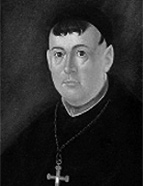

Francisco Justiniano Saraiva was born in Ponte de Lima on 26 January 1766 and baptised on 9 February. He was the son of Manuel José Saraiva, Notary Public, Judicial Notary and Notarial Clerk in his hometown, and Leonor Maria Teodora Correia. He was a Benedictine monk. He took his solemn vow in the Order at the Monastery of Santa Maria de Tibães on 27 January 1782, the day after his sixteenth birthday. When he took his vows, he decided to change his name to Francisco de S. Luís. Throughout his life, he showed great sympathy for liberal and Enlightenment ideas and played an important role in the political and social life of his time. His interventionist stance repeatedly impacted his religious and academic career. There are multiple references suggesting that he belonged to the Freemasons, adopting the name Condorcet; however, in 1945, he published a text in the Mensageiro de São Bento denying that he was part of said organisation. António Ventura, in Uma História da Maçonaria em Portugal [A History of Freemasonry in Portugal], 1727-1986, emphasises the role of Freemasonry in the implementation of the liberal regime in Portugal, identifying the Freemasons who were part of the Provisional Boards that were created, first in Porto and then in Lisbon, with the name of Francisco de S Luís on both lists. Oliveira Marques says that he was probably initiated in a lodge in Coimbra before 1821, under the symbolic name of Condorcet.
In 1808, he was appointed to the Board established in Minho to guide the kingdom's affairs and lead the fight against the French invaders. In 1820, as the movement toward establishing a constitutional monarchy began, he was once again called upon to serve in a public role, joining the Junta Provisória do Supremo Governo do Reino [Provisional Board of the Supreme Government of the Kingdom], which was established in Porto. At the end of 1822, he was elected deputy to the ordinary courts, becoming their president in February of the following year. The very next year, with the fall of the 1822 Constitution, he abandoned these duties and retired to the Monastery of Batalha. He returned to an active political life in 1826, as a deputy to the courts, only to abandon this role again in 1828 as a result of King Miguel's rise to power. He then retired to the Monastery of Serra de Ossa, where he stayed for six years. With the end of the Civil War and the liberal victory in 1834, he became involved in active politics once again. He was a member of parliament three times, in 1834, 1836 and 1838. With the death of King Pedro IV, he left the courts, having been invited by the young queen to become Minister for Kingdom Affairs. At the same time, he served as Chief Guard of the Royal Archives of the Torre do Tombo from 4 June 1834 until the end of September 1836. He was also a Counsellor of State and a Peer of the Realm.
This work is financed by national funds through FCT - Foundation for Science and Technology, I.P, in the scope of the projects UIDB/04311/2020 and UIDP/04311/2020.
